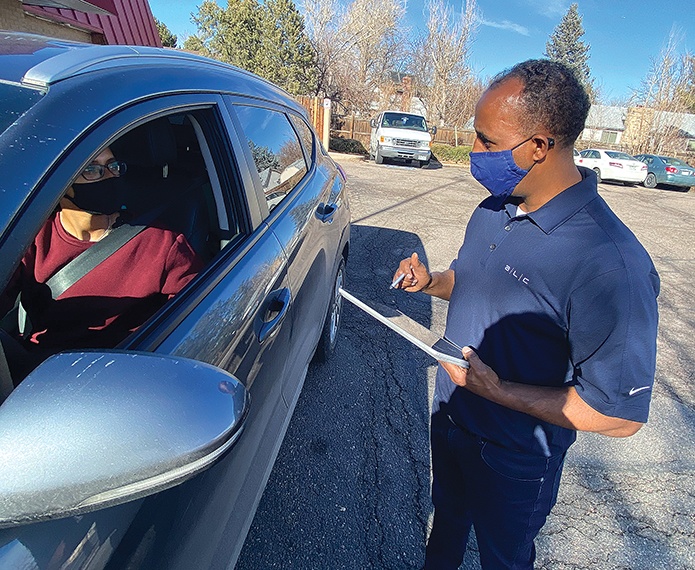
Colorado has some of the most stringent state and district-specific compliance requirements for student transportation in the country. Colorado districts serve students with special needs, students who fall under the McKinney-Vento Act, medically-fragile kids, and foster youth – and many districts take advantage of the state’s numerous specialty schools for these students.
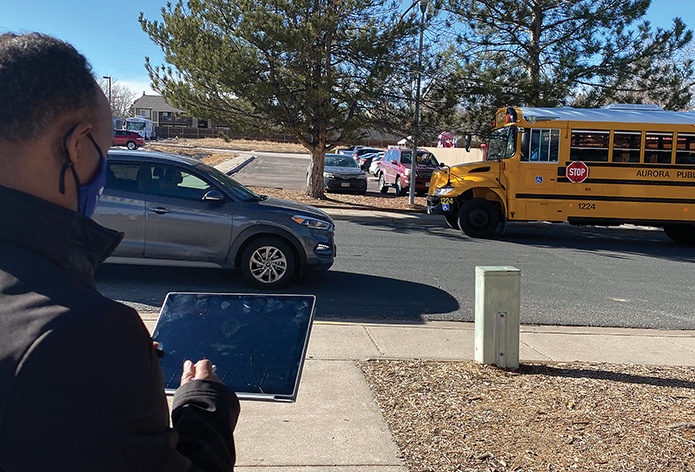
Twenty-three of the state’s 181 districts partner with ALC Schools to provide the most vulnerable students with individualized transportation. ALC Schools is a student transportation company that has been transporting students across the country for two decades now.
Because ALC can meet Colorado’s standards of compliance and consistency, the company’s unique model provides the state’s most vulnerable students with individualized student transportation, getting them to and from school with a specially assigned vehicle and driver.
“Colorado has done a fantastic job in regulating alternative student transportation,” said Megan Carey, chief development officer at ALC Schools. “Our model of consistency benefits even the most difficult-to-serve children. We believe in forming partnerships with districts, where the end goal of safe and consistent student transportation gives the kiddos the care they require to arrive at school ready to learn, and a predictable trip that is just as important when they return home.”
 ALC Schools was first established in the early aughts in Orange County, California, and has grown to now partner with more than 450 school districts in 22 states. Their model is based on reducing costs for districts, while also providing parents/guardians with peace of mind by providing kids with the same driver every day. ALC’s internally developed trip-tracking and smart-routing technology helps ensure that each student is matched with the right vehicle, for a safe and comfortable trip to and from school. Their technology also ensures transparency for district and school staff, and soon to be with parents as the launch of their parent app is in beta testing. Though the parent app is not required for this service as ALC is a full-service company, ALC decided to invest into the technology for when their district parents might want to use it, even if it is on a parent-to-parent basis.
ALC Schools was first established in the early aughts in Orange County, California, and has grown to now partner with more than 450 school districts in 22 states. Their model is based on reducing costs for districts, while also providing parents/guardians with peace of mind by providing kids with the same driver every day. ALC’s internally developed trip-tracking and smart-routing technology helps ensure that each student is matched with the right vehicle, for a safe and comfortable trip to and from school. Their technology also ensures transparency for district and school staff, and soon to be with parents as the launch of their parent app is in beta testing. Though the parent app is not required for this service as ALC is a full-service company, ALC decided to invest into the technology for when their district parents might want to use it, even if it is on a parent-to-parent basis.
It is critical for districts to understand the difference between ALC’s model and that of other companies. Even though in some areas they might serve some of the same populations of students, Carey said some models are extremely different and it is good to understand what a company can or cannot do including driver consistency, as that is extremely important in a bus as well as a smaller capacity vehicle.
“ALC deals exclusively in student transportation, which makes a huge difference when it comes to regulations, compliance, and insurance – not to mention the care we provide for the kids,” Carey said.
“That philosophy is so different because many of the people who work at ALC have a loved one or close connection who is living with special needs,” Carey continued. “This is in our blood.”
Carey said that ALC is uniquely suited to provide specialized transportation to medically-fragile students with extremely specific transportation needs, as well as unhoused students who might live in multiple locations depending on the day. For normal buses, route manipulation on that level can severely disrupt a district’s transportation. Carey said that, early on, ALC quickly figured out that its model fits well as a niche to help alleviate districts’ myriad transportation issues.
Chad Williams, ALC’s western director of field operations said that ALC and Colorado’s compliance philosophies match up well, as the company was already practicing many of the state’s requirements before working there. This included small vehicle, mountain driving and adverse weather training for drivers, vehicle inspections by a mechanic who has been certified by the state’s Department of Education, and much more including drug screenings and background checks.
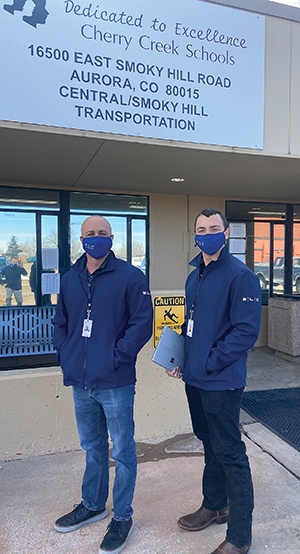 “The vetting criteria for alternative transportation in Colorado stand out among other states in which I work,” Williams said. “Our ability to form partnerships with districts here is critical. The sheer volume of trips we provide in Colorado forces us to be very detail oriented, and high-level communication is the key.”
“The vetting criteria for alternative transportation in Colorado stand out among other states in which I work,” Williams said. “Our ability to form partnerships with districts here is critical. The sheer volume of trips we provide in Colorado forces us to be very detail oriented, and high-level communication is the key.”
Williams said that ALC works diligently to ensure that all its drivers meet Colorado’s compliance requirements in order to service its district partners’ trips. Williams added that ALC services a particularly high number of special-education students in Colorado as compared to other states, which adds another level of detail to day-to-day operations.
“A child with autism, for example, might need to attend a specialty school that could be located 20 miles from the child’s district,” he said. “Our responsibility is to pick that child up and get them to school as uneventfully as possible. To do that, we need to know a lot of details.”
“Children with autism often look for consistency,” he continued, “so we need to ensure they have the same driver, in the same vehicle, arriving at the same time every day. The driver will sit the child in the same spot in the vehicle and take the same route every day. If anything goes wrong, it could throw that child’s entire day into turmoil. Our attention to detail is vital.”
Each Colorado district and school partner utilizes ALC’s services in a unique and distinct way. For example:
Denver Public Schools
Denver Public Schools is a large district consisting of approximately 93,000 students. The district has 41,000 transportation-eligible students, and provides daily transportation for more than 36,000 students by yellow bus, 4,800 by the Denver RTD transit system, and 588 by ALC Schools.
“Our number of students transported can vary a bit, simply because of how many modes of transportation we provide,” said Albert Samora, executive director of transportation at Denver Public Schools. “Our routes are provided via traditional yellow bus and by partners like ALC Schools, and many of our high school students use the Denver RTD transit system.”
The volume of students ALC transports includes students falling under the umbrellas of McKinney-Vento, special education, School of Choice, and more. Samora said that ALC transports many single riders for Denver Public Schools, due to behavioral and social challenges.
With the volume of these trips, it was becoming challenging for the district to launch school in August and January 2019. ALC’s field operations team worked closely with transportation management to develop a software dashboard for onboarding students, giving the district real-time status of upcoming new starts, and allowing the district and ALC to be on the “same page” at every moment.
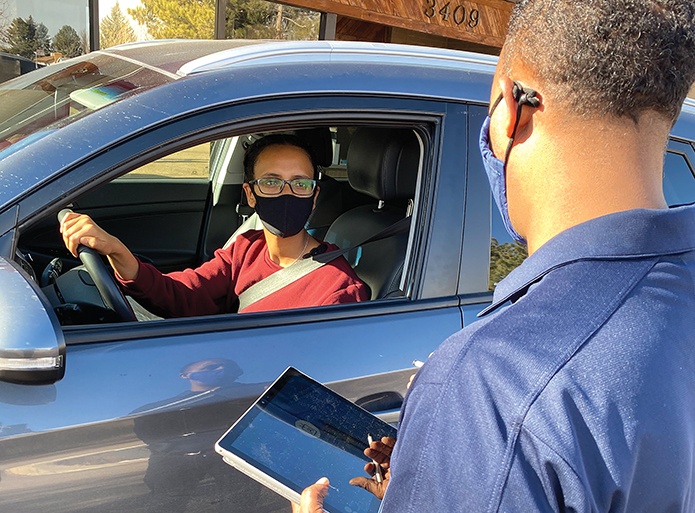
“We reached out because we wanted a solution that would give us more information on the students that ALC was transporting for us,” Samora said.
Now, Samora said, launches are seamless, and the technology has eliminated substantial amounts of confusion, saving hours of manpower for both ALC and the district.
“The technology saves me headaches,” he said. “I can go into the system and do a school-level search, or a student-level search using student IDs, and instantly pull up the status of my students. I can see their trips, and where they are at any given moment. That is important, as I no longer need to request that information from ALC – I can find it right on the dashboard.”
This technology product has evolved into an ALC nationwide release called the District Portal, utilized by districts all over the country. Carey said that this is an example of a true partnership coming together to better serve the district and the community – requiring not only investment by ALC, but trust in a longstanding relationship by the district.
“We have a deep appreciation for Denver Public Schools, because this technology propelled us forward as well,” she said. “Helping them helped us in developing this tool for the entire country.”
Another large public school district in Colorado relies on ALC to transport a variety of students including those under McKinney-Vento, special education, and early childhood, and ALC is entrusted with the district’s especially difficult-to-service trips.
Kiki Abebe, ALC Schools’ account manager in Colorado, recalled a time when ALC had been transporting a particular student for a few months, quickly learning that she will not do things when she is directed by the driver, school staff, or anyone else – unless she is rewarded for each time she is asked to do something.
One December day, ALC’s driver arrived at the student’s school to drop her off. The student indicated that she would not get off the vehicle unless she was provided with her usual candy. Because she was enrolled in this specialized school to work on these challenges – among other needs – the school district representative and school staff directed the driver to stay put for as long as needed.
The driver waited patiently for 97 minutes until the student complied and left the vehicle without the requested candy – a lesson which was vitally important to this student’s development.
“ALC’s service is unique because we have a system in place to have the driver and monitor comply with the school district’s request at a moment’s notice, based on the student’s unique needs,” Williams said.
Cherry Creek School District
Cherry Creek School District, located in western Arapahoe County, Colorado, has a significant amount of specialty schools within the district and many students with unique needs. This includes medically-fragile children, where the assigned vehicles and drivers are specifically trained to meet each child’s individual need.
“The students we service have a huge variety of special needs,” said Christa Boyles-Cash, assistant director of transportation for Cherry Creek School District. “Many of the students are enrolled in specialty behavior intervention programs, and many of those sites are in locations not conducive for standard yellow-bus transportation.”
Cherry Creek is notable, Williams said, in that the district is constantly reviewing student transportation policies and takes a keen interest in ALC’s unique student transportation model.
“We are a consistent provider that Cherry Creek has used as a standard part of their business plan for many years,” he said.
“Specialized transportation for our students is so important,” Boyles-Cash said. “The variations in requirements for transporting these students are quite large, and usually set by the schools. ALC works tirelessly with us in order to meet those requirements for each student, to ensure the student can literally get to their own education.”
Boyles-Cash added that ALC provides integration with parents, letting them know when a route has been set, what time their child will be picked up, and what the car looks like. If there is a driver substitution, the new driver calls ahead to identify themselves.
“If a parent has an issue, I will call them along with someone from ALC,” she said. “That is a very big reassurance to the parent. It is very important that they know ALC drivers are vetted just the same as district drivers, and that their kiddo is safe.”
Pushing specialized transportation forward in Colorado
“We work as an extension of a school district,” Carey said. “When it comes to training, requirements, and other best practices, we are doing exactly what the districts are doing.”
This means, she said, districts and parents hopefully look at ALC as nothing more than an extension of a district’s yellow bus service. The parents’ expectations are that ALC will provide the same level of professional service as their district’s safest bus drivers.
To accomplish that, the districts must rely on ALC to be that extension – a true partner, and not just a vendor.
“It is not enough to get a kid to and from school – we must get them there safely and ready to learn,” Williams added. “The people working for ALC in Colorado have a caring quality. You really have to care about the kids to provide this service at this level. Otherwise, it is just a business transaction, and that is just not who we are.”

